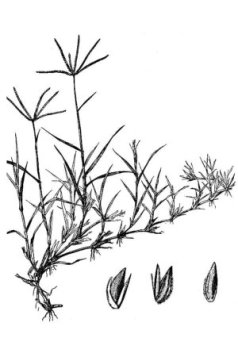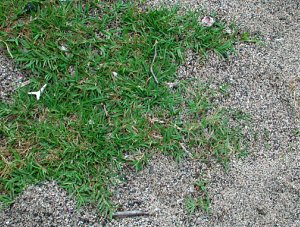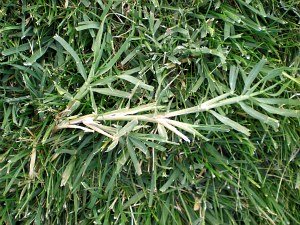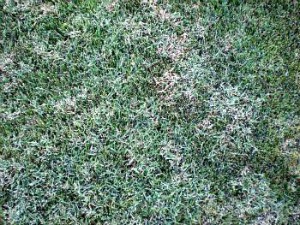Bermuda Grass (Cynodon dactylon)–also called Wiregrass or Devil Grass–is a warm-season, perennial grass weed that is very aggressive and hard to control once it becomes established. This weed invades lawns, landscape beds and gardens as far north as Minnesota. It will spread and creep over barriers and grow on and through landscape fabrics. It is often mistaken by homeowners as crabgrass because the seed heads are similar.
Although a weed in cool climates, Bermuda grass is also a valuable turfgrass species. There are several cultivated varieties and hybrids that are grown as lawns, sports fields, and golf courses in the southern and transition zones.
It has a ‘wiry’ growth habit and spreads by stolons and rhizomes that root at the nodes. Bermuda grass thrives in warm temperatures and full sun, it is not shade-tolerant. Once the temperatures drop below 60° F in the fall it goes dormant, turning brown, for the winter.
Wiregrass is a very aggressive and hard-to-control weed once established. Herbicide applications are usually required to kill or suppress it. In some cases, cultural methods such as proper mowing, watering and fertilizing can be used to favor the growth of valuable lawn grasses while suppressing Bermuda grass.

Hitchcock, A.S. (rev. A. Chase). 1950. Manual of the grasses of the United States. USDA Miscellaneous Publication No. 200. Washington, DC. 1950
Characteristics
- Warm-season perennial grass
- Reproduces by seeds or stems (stolons and rhizomes)
- Goes dormant turning brown with cool fall temperatures
- A lawn weed but also a valuable lawn, pasture or sports turfgrass
- Only grows in full sun, it is not shade-tolerant
- Usually has to be controlled with herbicides but cultural methods (mowing, watering, fertilizing) can be used to suppress it
- Very aggressive and persistent weed
Weed Images



Weed ID
Perennial grassy weeds are difficult to kill, especially when they are growing in established lawns. There are two approaches that can be taken: cultural methods that suppress Bermuda grass growth or control/eradication by using herbicides.
Maintenance practices that will suppress Bermuda include:
- Avoid fertilizing in the summer
- Do not over-water
- Mow high
- Overseeding with perennial ryegrass or tall fescue
Non-Selective Herbicides
Glyphosate (Roundup) is the most common non-selective herbicide used to kill weeds and unwanted vegetation. To kill Bermuda grass, two or three applications are usually required at two-week intervals. Start spraying in late spring when the grass breaks dormancy. The leaves need to be green and actively growing for the glyphosate to work.
Selective Herbicides
There are three selective herbicides available to professional applicators that can be used to suppress Bermuda grass.
- Fusilade II, 2 EC – used on tall fescue lawns only. Apply in late spring and again in early fall.
- Acclaim Extra 0.57 EC – start applications in late spring and repeat as needed.
- Prograss 1.5 EC – not for use on zoysia grass or fine fescue lawns. Start applications in late spring with one or two repeat applications.
QUESTION: What is Bermuda grass? Wire Grass?
Bermuda grass Cynodon dactylon is a warm-season perennial grass. It is a valuable lawn, pasture and sports turf in warm climates and also a very aggressive and hard-to-kill weed in cool-season lawns, orchards, gardens and landscape beds.
When it is a weed, Bermuda grass is also called Wire Grass and is often referred to by the lawn pros as Common Bermuda. It is often mistaken as crabgrass, most likely because the seed heads are similar.
Hybrid Bermuda Grass – There are several improved (or cultivated varieties) widely used on golf courses and sports fields. It makes a great playing surface because it can be cut short and recovers quickly from damage.

In Southern climates, Common Bermuda Grass is planted as lawns and pasture grass. When planted as a lawn or sports turf, a common practice is to overseed in the fall with perennial ryegrass to keep it green over the winter.

Common Bermuda or Wire Grass is a very aggressive lawn weed. Below is a picture of wire grass in a Kentucky bluegrass lawn.

It’s a very aggressive and hard-to-kill weed. Once established, herbicides are usually required to control it. Bermuda spreads by above-ground and below-ground shoots (stolons and rhizomes) that will root and form new plants, making pulling an ineffective way to remove this weed.
